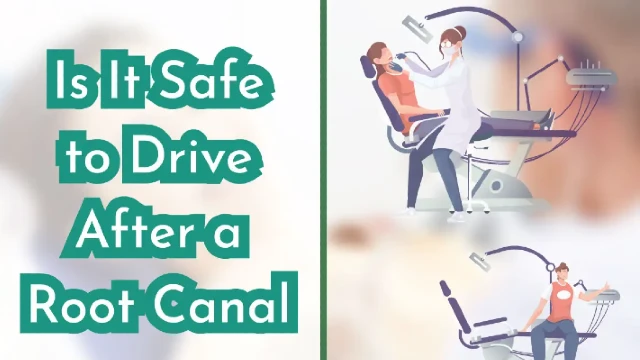Root canals are a common dental procedure used to fix painful teeth and save them from being taken out.
According to American Association of Endodontists, In the United States, about 15 million of these procedures happen every year.
But here’s a question many people have: Can you drive after getting a root canal? The answer isn’t as simple as yes or no. It depends on a few things.
In this article, we’ll talk about what root canals are, the different kinds of numbing medicine used, the impact of the medicine you might take afterward, and how all these things affect whether it’s safe to drive right after having this dental work done. It’s important to understand these things not just for your safety but for the safety of others on the road too.
Safety Guide: Can You Drive After A Root Canal

Whether or not you can drive after a root canal depends on a few factors, including the type of anesthetic used, the complexity of the procedure, and how you are feeling. In general, it is recommended that you avoid driving for at least 24 hours after a root canal, or until the effects of the anesthesia have worn off.
If you were given local anesthesia, you may be able to drive home after the procedure, but it is important to be aware that the anesthesia may affect your coordination and reaction time. If you were given general anesthesia, you will need to have someone drive you home and stay with you for at least 24 hours, as the anesthesia can make you drowsy and disoriented.
In addition to the effects of the anesthesia, the complexity of the root canal procedure can also affect your ability to drive. If the procedure was simple and straightforward, you may be able to drive home after the procedure.
However, if the procedure was more complex, or if you had any complications, you may need to avoid driving for longer than 24 hours.
Finally, it is important to listen to your body and avoid driving if you are not feeling well. If you are experiencing any discomfort, such as pain, dizziness, or nausea, it is best to wait until you are feeling better before driving.
Safety Tips for Driving After a Root Canal
In general, it’s a good idea to arrange for someone to drive you to and from the root canal appointment if you’re unsure about how you’ll feel afterward.
You can gauge your ability to drive based on your comfort level, the type of anesthesia or medications used, and any specific instructions or guidance provided by your dentist or endodontist.
Safety is paramount, so if there is any doubt about your ability to drive safely, it’s best to wait or make alternative transportation arrangements.
- Avoid driving if you have taken any pain medication that may impair your judgment or reaction time.
- Don’t Drive until the effects of the anesthesia have worn off.
- Ask a friend or family member to drive you home if possible.
- If you must drive yourself, make sure to bring a passenger who can help you if needed.
- Take breaks often and rest if you feel tired.
Factors To Consider Before Driving Right After Root Canal

Whether you can drive after a root canal procedure depends on various factors, including your personal comfort, the type of anesthesia used during the procedure, and any post-operative medication you may have been given. Here are some considerations:
Type of Anesthesia
If you received local anesthesia (numbing of the area around the tooth) for the root canal, you should be able to drive after the procedure. This type of anesthesia typically doesn’t impair your ability to operate a vehicle.
Sedation or General Anesthesia
In some cases, especially if the procedure is complex or if you have dental anxiety, your dentist or endodontist might use sedation or general anesthesia. If this is the case, it’s important to arrange for someone to drive you home after the procedure. You should not drive under the influence of sedative medications.
Post-Operative Medications
After a root canal, you may be prescribed pain medication or antibiotics, depending on the situation. Some pain medications can cause drowsiness, so it’s important to assess how these medications affect you before driving. If they make you drowsy, you should wait until you are no longer impaired before getting behind the wheel.
Discomfort and Recovery
Root canal procedures can cause some discomfort, swelling, and tenderness in the affected area. Depending on your level of discomfort, it may be more comfortable to wait until you feel better before driving.
Different Kinds Of Numbing Medicine Used In Root Canal
Numbing medications, also known as local anesthetics, are commonly used during root canal procedures to ensure that patients are comfortable and pain-free.
These medications work by blocking nerve signals in the affected area. The type of local anesthetic used and its duration of effect can vary from one individual to another, but there are some common options:
| Local Anesthetic | Duration of Numbness | Common Side Effects |
| Lidocaine | 1-2 hours | Mild dizziness |
| Articaine | 2-4 hours | Temporary numbness, dizziness |
| Bupivacaine | 4-8+ hours | Prolonged numbness (less common) |
| Mepivacaine | 1-3 hours | Mild dizziness |
The duration and extent of numbness can vary depending on factors such as the specific local anesthetic used, the dose administered, and individual variations in metabolism.
Dizziness or lightheadedness is more commonly associated with the initial injection and typically subsides as the numbing agent takes effect. Most patients are fully alert and able to resume normal activities shortly after a root canal procedure.
It’s essential to discuss any concerns or potential side effects with your dentist or endodontist before the procedure. They can provide you with more information about the specific local anesthetic they plan to use and address any questions or concerns you may have regarding its effects on your body.
FAQs
Do you need bed rest after a root canal?
You do not need to go on bed rest after a root canal, but it is important to take it easy for the first 24 hours. Avoid strenuous activity and chewing on the side of your mouth where the root canal was performed.
Is it OK to walk after root canal?
Yes, it is OK to walk after a root canal. In fact, walking can help to reduce swelling and improve circulation. Just be sure to avoid walking for long periods of time or at a fast pace.
Can I brush my teeth the night after a root canal?
Yes, you can brush your teeth the night after a root canal. Just be gentle and avoid brushing the area where the root canal was performed. You may also want to use a soft-bristled toothbrush and avoid using toothpaste.
How long after root canal can I eat?
You can eat as soon as the anesthesia has worn off. However, it is important to avoid chewing on the side of your mouth where the root canal was performed. You may also want to eat soft foods for the first few days.
Can I eat ice cream after root canal?
Yes, you can eat ice cream after a root canal. However, it is important to avoid chewing on the side of your mouth where the root canal was performed. You may also want to eat the ice cream slowly to avoid any discomfort.
How long will my face be swollen after a root canal?
Swelling after a root canal is normal and typically lasts for 2-3 days. However, if the swelling is severe or does not improve after a few days, you should contact your dentist.
Conclusion
In the end, the ability to drive after a root canal hinges on several crucial factors, from the type of anesthesia administered to the post-operative medications and your personal comfort level.
While local anesthesia usually permits safe driving, sedation or general anesthesia requires an alternative ride home.
Post-operative medications, especially pain relievers that can cause drowsiness, should be considered when deciding to get behind the wheel.
Safety must always be paramount, and it’s advisable to heed the guidance of your dentist or endodontist. When in doubt, waiting a little longer or arranging for a responsible driver is a small price to pay for the well-being of both yourself and others on the road.
Related: Why Do Baby Grind Their Theeth?


